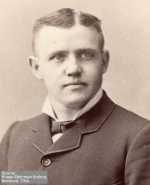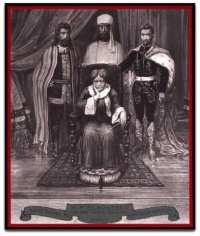User:SysopJ/My sandbox: Difference between revisions
No edit summary |
|||
| Line 1: | Line 1: | ||
'''J. Augustus Knapp''' was an American [[Theosophist]] and artist best known for his suburb illustrations of [[Manly Palmer Hall|Manly P. Hall's]] masterwork '''''The Secret Teachings of All Ages''''' and many works of science fiction and fantasy. | '''J. Augustus Knapp''' was an American [[Theosophist]] and artist best known for his suburb illustrations of [[Manly Palmer Hall|Manly P. Hall's]] masterwork '''''The Secret Teachings of All Ages''''' and many works of science fiction and fantasy. | ||
[[File:J A Knapp as young man .jpg|right| | [[File:J A Knapp as young man .jpg|right|150px|thumb|Young J. A. Knapp]] | ||
== Early years and education == | == Early years and education == | ||
| Line 9: | Line 9: | ||
Knapp was admitted as a member of the [[Cincinnati Theosophical Society]] on January 19, 1892, giving his address as "Strobridge Lith. Co., Cincinnati, O."<ref>Theosophical Society General Membership Register, 1875-1942 at [http://tsmembers.org/ http://tsmembers.org/]. See book 1, entry 7876 (website file: 1C/49).</ref> Both he and his wife attended lodge meetings at the home of [[Jirah Dewey Buck|Dr. J. D. Buck]], and the also weekly Secret Doctrine class studying [[The Secret Doctrine (book)|''The Secret Doctrine'']] using [[William Quan Judge|William Quan Judge’s]] new book [[The Ocean of Theosophy (book)|''The Ocean of Theosophy'']] as a guide. | Knapp was admitted as a member of the [[Cincinnati Theosophical Society]] on January 19, 1892, giving his address as "Strobridge Lith. Co., Cincinnati, O."<ref>Theosophical Society General Membership Register, 1875-1942 at [http://tsmembers.org/ http://tsmembers.org/]. See book 1, entry 7876 (website file: 1C/49).</ref> Both he and his wife attended lodge meetings at the home of [[Jirah Dewey Buck|Dr. J. D. Buck]], and the also weekly Secret Doctrine class studying [[The Secret Doctrine (book)|''The Secret Doctrine'']] using [[William Quan Judge|William Quan Judge’s]] new book [[The Ocean of Theosophy (book)|''The Ocean of Theosophy'']] as a guide. | ||
[[File:HPB with Ascended Masters.jpg|200px|right|thumb|HPB with Ascended Masters]] | |||
In 1895, when most branches (lodges) of the American Section voted to separate from the parent society in Adyar, the Cincinnati group also voted to follow William Quan Judge into establishment of a new national organization. Knapp | In 1895, when most branches (lodges) of the American Section voted to separate from the parent society in Adyar, the Cincinnati group also voted to follow William Quan Judge into establishment of a new national organization. Knapp | ||
continued to be active with that group rather than affiliating with the [[Theosophical Society (Adyar)|Theosophical Society in Adyar, India]]. On March 2, 1897, for example, he delivered a presentation on the "The Law of Duality in Manifested Nature." | continued to be active with that group rather than affiliating with the [[Theosophical Society (Adyar)|Theosophical Society in Adyar, India]]. On March 2, 1897, for example, he delivered a presentation on the "The Law of Duality in Manifested Nature." | ||
| Line 17: | Line 17: | ||
== Artistic career == | == Artistic career == | ||
His first collaboration with '''John Uri Lloyd''' was the hugely popular '''''Etidorhpa, or, the End of the Earth: the Strange History of a Mysterious Being and the Account of a Remarkable Journey''''' (1895), which was printed in eighteen editions and in seven languages. Other works included ''The Right Side of the Car'' (1897) and ''Felix Moses: the Beloved Jew of Stringtown on the Pike'' (1930). | Much of Knapp's career was spent in illustrating a wide variety of books – occult works, science fiction, poetry, and scientific drawings. One of his paintings that has been of special interest to Theosophists for decades is of [[Theosophical Society]] Founder [[Helena Petrovna Blavatsky]] seated, with three "Ascended Masters" around her. | ||
His first collaboration with '''John Uri Lloyd''' was the hugely popular '''''Etidorhpa, or, the End of the Earth: the Strange History of a Mysterious Being and the Account of a Remarkable Journey''''' (1895), which was printed in eighteen editions and in seven languages. It is a fantastic tale of a hollow earth. The title is "Aphrodite" spelled backward. Other works included ''The Right Side of the Car'' (1897) and ''Felix Moses: the Beloved Jew of Stringtown on the Pike'' (1930). | |||
Working with '''[[Manly Palmer Hall]]''' brought him an additional measure of fame. They worked together to design one of the most admired Tarot decks. Knapp illustrated many of Hall's occult books and periodicals, including: | |||
* ''An Encyclopedic Outline of Masonic, Hermetic, Qabbalistic, and Rosicrucian Symbolical Philosophy: Being an Interpretation of the Secret Teachings Concealed within the Rituals, Allegories, and Mysteries of All Ages''. Privately printed by subscription in 1928, this work has been almost continuously in print since then in many editions and under various titles. | * ''An Encyclopedic Outline of Masonic, Hermetic, Qabbalistic, and Rosicrucian Symbolical Philosophy: Being an Interpretation of the Secret Teachings Concealed within the Rituals, Allegories, and Mysteries of All Ages''. Privately printed by subscription in 1928, this work has been almost continuously in print since then in many editions and under various titles. | ||
* ''The Initiates of the Flame: He Who Lives the Life Shall Know the Doctrine''. Los Angeles, 1922. Later editions. | * ''The Initiates of the Flame: He Who Lives the Life Shall Know the Doctrine''. Los Angeles, 1922. Later editions. | ||
Revision as of 02:43, 1 February 2023
J. Augustus Knapp was an American Theosophist and artist best known for his suburb illustrations of Manly P. Hall's masterwork The Secret Teachings of All Ages and many works of science fiction and fantasy.
Early years and education
Theosophical society involvement
Knapp was admitted as a member of the Cincinnati Theosophical Society on January 19, 1892, giving his address as "Strobridge Lith. Co., Cincinnati, O."[1] Both he and his wife attended lodge meetings at the home of Dr. J. D. Buck, and the also weekly Secret Doctrine class studying The Secret Doctrine using William Quan Judge’s new book The Ocean of Theosophy as a guide.
In 1895, when most branches (lodges) of the American Section voted to separate from the parent society in Adyar, the Cincinnati group also voted to follow William Quan Judge into establishment of a new national organization. Knapp continued to be active with that group rather than affiliating with the Theosophical Society in Adyar, India. On March 2, 1897, for example, he delivered a presentation on the "The Law of Duality in Manifested Nature."
In addition to his activities in the Theosophical Society, Knapp was an honorary 33° Scottish Rite Freemason. Dr. Buck and James Ralston Skinner were also Masons in Cincinnati.
Artistic career
Much of Knapp's career was spent in illustrating a wide variety of books – occult works, science fiction, poetry, and scientific drawings. One of his paintings that has been of special interest to Theosophists for decades is of Theosophical Society Founder Helena Petrovna Blavatsky seated, with three "Ascended Masters" around her.
His first collaboration with John Uri Lloyd was the hugely popular Etidorhpa, or, the End of the Earth: the Strange History of a Mysterious Being and the Account of a Remarkable Journey (1895), which was printed in eighteen editions and in seven languages. It is a fantastic tale of a hollow earth. The title is "Aphrodite" spelled backward. Other works included The Right Side of the Car (1897) and Felix Moses: the Beloved Jew of Stringtown on the Pike (1930).
Working with Manly Palmer Hall brought him an additional measure of fame. They worked together to design one of the most admired Tarot decks. Knapp illustrated many of Hall's occult books and periodicals, including:
- An Encyclopedic Outline of Masonic, Hermetic, Qabbalistic, and Rosicrucian Symbolical Philosophy: Being an Interpretation of the Secret Teachings Concealed within the Rituals, Allegories, and Mysteries of All Ages. Privately printed by subscription in 1928, this work has been almost continuously in print since then in many editions and under various titles.
- The Initiates of the Flame: He Who Lives the Life Shall Know the Doctrine. Los Angeles, 1922. Later editions.
- The Lost Keys of Freemasonry or, the Secret of Hiram Abiff. New York: Macoy, 1923. Many later editions.
- The Tarot: an Essay. Los Angeles: Philosophical Research Society, 1978. Previous and later editions.
Other works he illustrated include:
- Collins, Laura Case. Egypt. Cincinnati: The Robert Clarke Company, 1900. A book of poetry.
- Euripedes. Translated by Pryse, James M. The Adorers of Dionysos (Bakchai). London: Watkins, 1925.
- Lloyd, Curtis Gates. Plates of Fungi. Portfolio of color illustrations commissioned by C.G. Lloyd, and produced between 1910-20. Held at the Lloyd Library and Museum.
Knapp also wrote his own work, Divination with Tarot Cards, published by Llewellyn Publications in Los Angeles, 1936.
Additional resources
Social Media
- J. Augustus Knapp Facebook page.
- Augustus Knapp Pinterest page.
Notes
- ↑ Theosophical Society General Membership Register, 1875-1942 at http://tsmembers.org/. See book 1, entry 7876 (website file: 1C/49).

